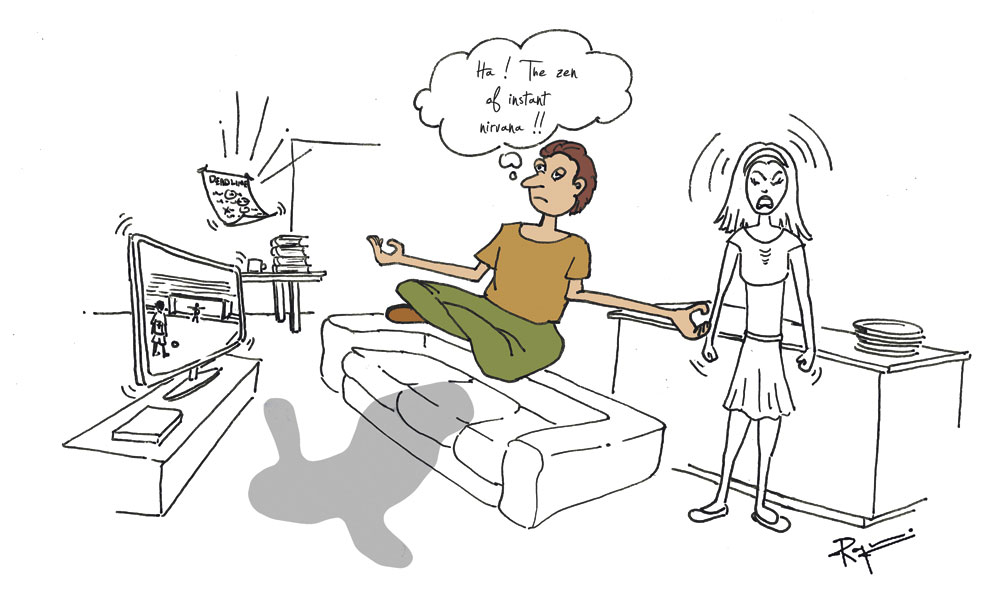A new program, called Yes+, offers student the support they need to combat study-related stress and lead ‘calm yet vibrant lifestyles’.
A recent survey conducted by various Dutch university newspapers revealed that TU Delft students are the most stressed-out students in the country. Looking at the kind of positive feedback the results of this survey received on the various social networking sites, it is quite evident that students are eager to find measures that would help them relieve stress and lead more productive lives.
In the subsequent search for solutions, it emerged that there are already quite a few programs and seminars organized within universities and by other organizations, aimed at helping students overcome stress. One of most intriguing of these is the Yes+ program, which is a 1 or 2 credit course taught in some of the major universities around the world, and which will now be offered to TU Delft students.
“Yes+ empowers students with teaching tools that eliminate stress, get rid of negative emotions from the system, develops strong social and leadership skills, increases focus and concentration, better time management skills and also incubates projects for community service,” says Aditya Kamalapurkar, an MSc Management Technology student who has been closely associated with the popular NGO –‘Art of Living’, and is in charge of organizing the YES+ course. “It empowers the youth to reach their highest potential.”
In fact universities like Harvard and Cornell have produced many favorable scientific reports about practices followed in this program. “Yes+ is a powerful life-skills program that charges the youth with a fresh breath of vigor, enthusiasm, excellence and responsibility,” Kamalapurkar continues. “Yes+ enables you to absorb the freshness, repose and all the positivity around you, helping you discharge stress, inhibitions, negative tendencies/habits, and barriers. It’s a brilliant mix of antiquity and the contemporary, a smooth blend of ancient wisdom, yoga, pranayama (breath control), and meditation, fused with contemporary intellectual exchanges, music and games.”
The Yes+ program by itself is not just about decreasing stress and anxiety, but it also helps strengthen leadership skills, enhance memory and concentration powers and, most importantly, teaches participants to lead a calm yet vibrant lifestyle. At universities across the globe, where it’s now recognized that it’s not just academics but the all-round development of a student which is important, the Yes+ program is offered as a credit course that students can do as a part of their academic program.
“In Europe, our volunteers conducted the Corporate Culture & Spirituality World Youth Forum, which was an extraordinary experience for 50 selected young professionals and university students,” Kamalapurkar says of some other activities conducted by the organization. “The World Youth Forum 2009 provided an open platform for participants (aged 18-35) to voice their messages to the world’s top economic and political decision-makers. Moreover, in the United States, our team did a project called ‘Deepening Roots’, an intensive multi-disciplinary summer internship that focused on community-oriented sustainable agriculture, together with leadership development, meditation and nutrition. The mission is to cultivate youthful leaders who could implement practical solutions, build communities, and inspire their generation towards a sustainable future.”
Further, ‘Insignia’ was a one-of-a-kind fundraising event organized by the Yes+ chapter in Kolkata, India. This event saw the volunteers channel their creative energy and come up with an evening of fun and laughter, including two plays, a dance performance and a game, with the funds raised by the event being used for slum development projects and environmental drives.
The Yes+ organization also has activities all across the Netherlands, in Amsterdam, Harlem, Den Haag, Delft, Rotterdam, and elsewhere. Moreover, a workshop was held at TU Delft last February, which had 33 participants of eight different nationalities. Given the positive feedback on this event, Yes+ is now hosting another workshop at the Lijm & Cultuur Center in Delft, from April 26-29, which is open to all interested TU students.
us.yesplus.org
en.yespluseurope.org
Ecorunner
The Eco-Runner Team Delft presented its hydrogen car this week during the car show at the Convention Centre Amsterdam RAI, where a car show is being held, together with a dozen other teams from the Netherlands. The cars will participate in the Shell eco-marathon, held at the end of May. The goal is to drive the longest distance on the equivalent of one liter of fuel. The current world record, held by Polytechnic Nantes, is 4,896 kilometres. (Photo: Tomas van Dijk)
Summerschool
TU Delft will host an international summer school of the Oxford Poverty Reduction Initiative (OPHI), an Oxford University research centre, from 24 August to 3 September. Poverty is usually associated with low income, but quite a few other factors play a role, including education, health, security, wellbeing and employment. Lectures on these topics will be given by philosopher Martha Nussbaum and Nobel Prize winner Amartya Sen. Registration is open until 1 May 2011.
www.ethicsandtechnology.eu/hdca
Mindboggling
If you think it’s a paradox to travel abroad to promote regional cooperation, how about a competition winning a prize in yet another competition. Both were in the news this week. Medical Delta (TU, Erasmus MC and Leiden University) went to Oxford to stress the virtues of cooperation in the region. And the importance of region’s working together – hence the visit. The Solar Decathlon Europe, a university competition to design a solar-powered house, won the European Commission’s prize for the best competition.
Glass
Architects are fond of glass facades, but how about using glass as a construction material. Reinforced glass beams are comparable in strength with reinforced concrete, says Dr Christian Louter, who wrote his PhD thesis on the structural aspects of reinforced glass beams. He tested numerous beams far beyond cracking point and relied on the steel or interlayer reinforcement to measure the residual strength.
Christian Louter, Fragile yet Ductile, 18 April 2011, PhD supervisor Professor Jan Rots (Architecture / CEG).



Comments are closed.